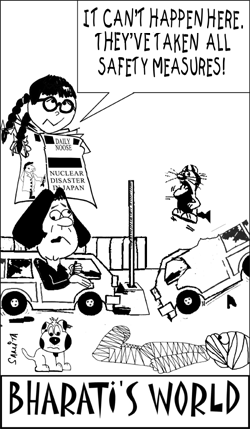Following endorsement of the Institutes of Technology (Amendment) Bill 2010 by the Lok Sabha on March 25 which provides for the promotion of eight new Indian Institutes of Technology (IITs), and the Congress-led UPA-II government’s declaration of intent to operationalise seven new Indian Institutes of Management (IIMs) and 30 Central universities directly funded and administered by the Union ministry of human resource development, there is considerable excitement within the bowers of academia in West Bengal. Conterminously the academy is looking forward to the end of 34 years rule by the Communist Party of India-Marxist (CPM)-led Left Front government. In the state legislative assembly elections due to be held in April-May, the Trinamool Congress-Congress alliance led by Mamata Banerjee (also the Union minister for railways) is all set to oust the Left Front coalition which has ruled uninterruptedly over West Bengal since 1977.
 The prospect of a slew of IITs, IIMs and Central universities opening up for business in the near future — as also the probability of the CPM being routed in the assembly polls — has enthused academics in the state because it will offer new job opportunities in the proposed Central government-administered institutions. “West Bengal hosts more postgrads and Ph Ds than any other state in India. With doubling in the number of IITs, IIMs and Central universities, it will offer us a great chance to seek greener pastures,” says a professor of economics at the University of Calcutta in gleeful anticipation.
The prospect of a slew of IITs, IIMs and Central universities opening up for business in the near future — as also the probability of the CPM being routed in the assembly polls — has enthused academics in the state because it will offer new job opportunities in the proposed Central government-administered institutions. “West Bengal hosts more postgrads and Ph Ds than any other state in India. With doubling in the number of IITs, IIMs and Central universities, it will offer us a great chance to seek greener pastures,” says a professor of economics at the University of Calcutta in gleeful anticipation.
Dr. Supriya Chaudhuri professor at the Centre of Advanced Studies, depart-ment of English, Jadavpur University, agrees that a brain drain from the state’s under-funded universities with notor-ious reputations for student militancy is imminent. “Higher education cannot be improved by permitting wage differentials between over-funded Central and under-funded state universities. This will result in poaching of the best state university faculty. The Centre needs to involve the states in its new plans for higher education. This isn’t happening,” says Chaudhuri.
Fears of faculty flight from West Bengal academia are spurred by the substantial spread between faculty salaries in the state and those mandated by the Sixth Pay Commission — and paid by Central universities. For instance, a university professor’s monthly salary, as mandated by the Sixth Pay Commission, is approximately Rs.90,000 and routinely paid by Central and state universities countrywide except in West Bengal. With a massive budget deficit of Rs.33,000 crore in fiscal 2010-11, the state government is unable to pay Sixth Pay Commission mandated salaries in its varsities with a full-professor in Jadavpur earning a mere Rs.70,000 per month.
With the Central government promulgating an additional eight IITs, seven IIMs and 30 Central universities which are likely to start recruiting on a massive scale shortly, the future has suddenly brightened for West Bengal’s short-changed academics. And an additional bonus is that the suffocating stranglehold of CPM apparatchiks on West Bengal’s colleges and universities is about to be broken.
Sujoy Gupta (Kolkata)